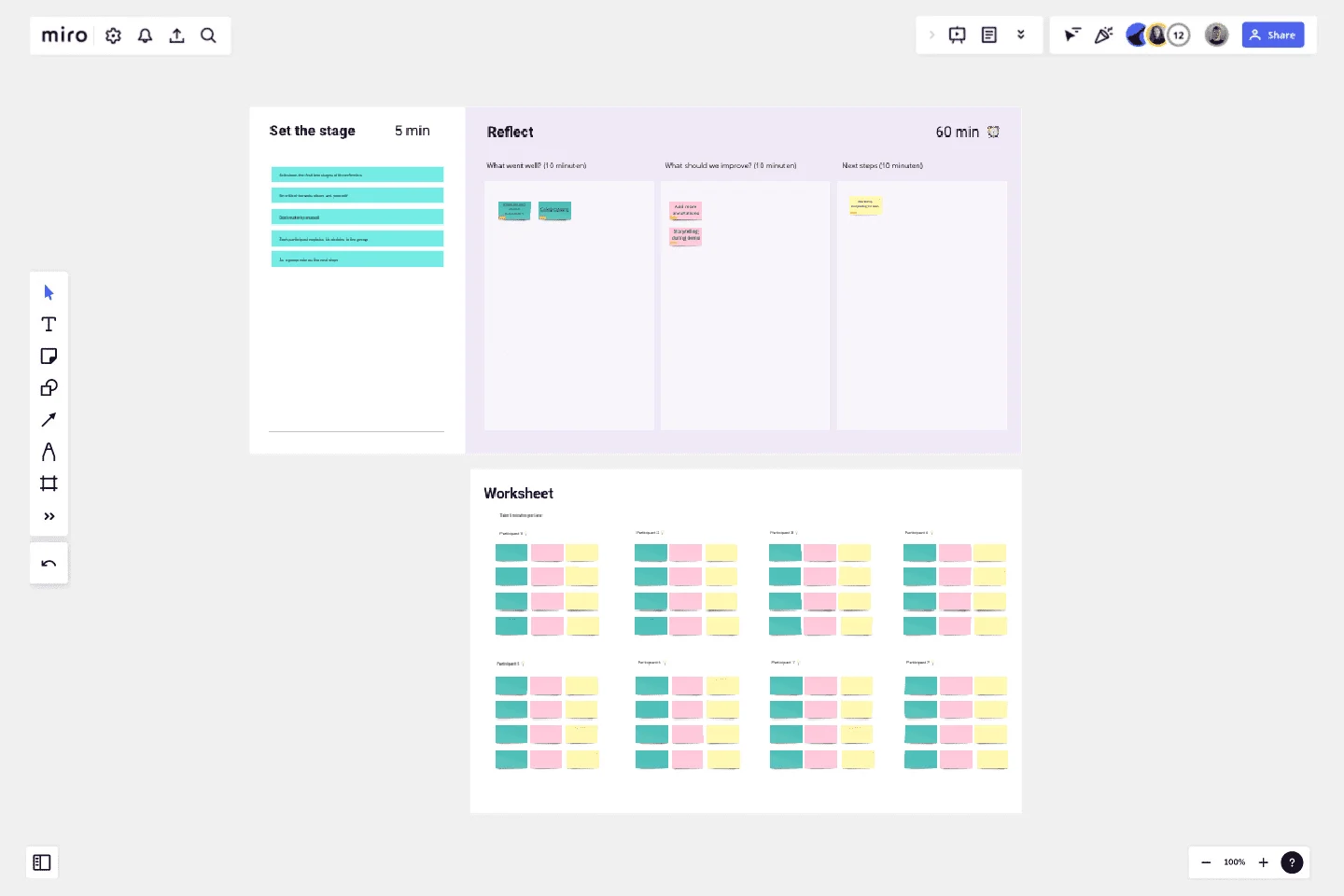Quick Retrospective by Online Department
Use this template to host one of the most important ceremonies of SCRUM.
A retrospective is a meeting held after every sprint to discuss what happened during the product development and release process, with the goal of improving things in the future based on those learnings and conversations. This board guides you through a 1 hour brainstorm of what went well, what should be improved and decide on the next steps.
This template was created by Online Department.
Get started with this template right now.
Easter Egg Retrospective
Works best for:
Agile Methodology, Retrospectives, Meetings
The Easter Egg Retrospective template offers a themed approach to retrospectives, incorporating elements of the Easter holiday. It provides elements for reflecting on past iterations, hunting for hidden insights, and brainstorming improvements. This template enables teams to have fun while addressing serious topics, fostering creativity and collaboration. By promoting a playful yet productive atmosphere, the Easter Egg Retrospective empowers teams to uncover hidden gems, drive improvement, and strengthen team cohesion effectively.
8 Bit Hearts - A Retrospective
Works best for:
Agile Methodology, Retrospectives, Meetings
The 8 Bit Hearts - A Retrospective template offers a nostalgic and creative approach to retrospectives, using retro gaming elements to engage team members. It provides elements for reflecting on past experiences, celebrating achievements, and identifying areas for improvement. This template enables teams to foster a fun and collaborative atmosphere, promoting open communication and creative thinking. By combining nostalgia with reflection, the 8 Bit Hearts - A Retrospective empowers teams to build stronger bonds, boost morale, and drive continuous improvement effectively.
Quick Retrospective Template
Works best for:
Education, Retrospectives, Meetings
A retrospective template empowers you to run insightful meetings, take stock of your work, and iterate effectively. The term “retrospective” has gained popularity over the more common “debriefing” and “post-mortem,” since it’s more value-neutral than the other terms. Some teams refer to these meetings as “sprint retrospectives” or “iteration retrospectives,” “agile retrospectives” or “iteration retrospectives.” Whether you are a scrum team, using the agile methodology, or doing a specific type of retrospective (e.g. a mad, sad, glad retrospective), the goals are generally the same: discovering what went well, identifying the root cause of problems you had, and finding ways to do better in the next iteration.
Canvas Playground Template
Works best for:
Templates
The canvas playground template is the ultimate way to explore all the features that make up Miro's Intelligent Canvas. This dynamic and interactive space is designed to help you get work done faster while engaging your team. From AI creation and Sidekicks to intelligent widgets, this template allows you to try it all and discover how these capabilities can streamline your workflow and enhance collaboration.
Learning Loop Retro Template
Works best for:
Retros, Agile
The Learning Loop Retro template is a powerful tool designed to help teams reflect on their projects by recognizing successes and identifying areas for improvement. This template is part of Miro's Intelligent templates, which streamline workflows and keep teams engaged by integrating AI, interactive tools, and seamless integrations. One key benefit of the Learning Loop Retro template is its ability to drive continuous improvement. By regularly reflecting on their work and identifying areas for enhancement, teams can consistently elevate their performance and achieve better outcomes.
Start, Stop, Continue Retrospective by Laura Timmins
Works best for:
Retrospectives, Agile Methodologies
The Retrospective template offers a flexible and customizable framework for teams to reflect on past experiences and identify areas for improvement. It provides elements for sharing successes, challenges, and action items. This template enables teams to facilitate constructive discussions, generate insights, and drive continuous improvement. By promoting reflection and collaboration, the Retrospective empowers teams to optimize performance and achieve their goals effectively.
